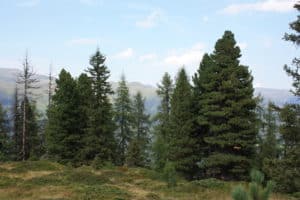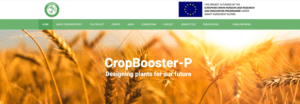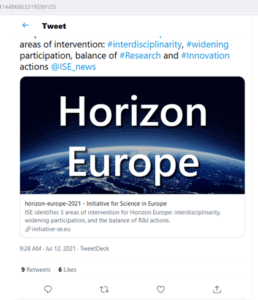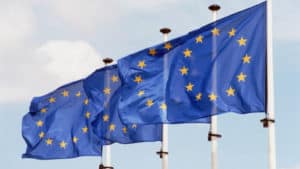NEWS
Stay updated on the latest developments in plant science policy and EPSO activities!
Building on the discussions from the June meeting, the September meeting of this WG will prepare a statement on research needs, discuss potential proposals to Horizon Europe 2022 calls and prepare a statement on the new EU Forest Strategy.
The meeting intends to increase collaborations between the working group members both bi-and multi-lateral. In addition, the statements the WG will prepare will include recommendations on R&I as science advice to policy to the European Commission as well as national authorities.
The workshop will be held online 27 September 2021 from 8 am – 12 noon Brussels time.
Draft agenda:
- Preparation of a statement on the need for
- fundamental research to support high-quality applications in Horizon Europe topics and calls
- further strengthen forests as production systems as a tool in climate change mitigation
- inclusion of research on contingency & alternative species
- developing advanced data bases.
- Analysis of Horizon Europe available information 2021-22 and beyond
- on the ideas towards 2023-2024 calls to identify sections to provide input for, in relation with (1.)
- on the 2022 calls published to identify topics in which a consortium could emerge from the Tree & Forest WG.
- Preparation of a statement on the new EU Forest Strategy.
Administrative information
Log-in details for the online meeting will be sent to registered participants.
EPSO members: We kindly ask you to register for your participation to the workshop by 10 September by e-mail to Karin Metzlaff.
We very much look forward to your contributions and to welcoming you at the workshop.
Ivan Scotti, Berthold Heinze, Roger Hellens and Karin Metzlaff
Contacts:
Ivan Scotti (INRE / FR, chair), Berthold Heinze (BFW / AT, chair), Roger Hellens (Scion / NZ, chair) and Karin Metzlaff (EPSO Executive Director)
Our climate is changing and the world population is growing to an estimated 10 billion people by 2050. This may cause serious problems in global food supply, protection of the environment and safeguarding Earth’s biodiversity.
To face this challenge, agriculture will have to adapt and a key element in this will be the development of “future proof” crops. These crops not only will have to be high-yielding, but also should be able to withstand future climate conditions and will have to make very efficient use of scarce resources like water, phosphorus and minerals.
Future crops not only should sustainably give access to sufficient, nutritious, and diverse food to a worldwide growing population, but also support the circular bio-based economy and contribute to lower atmospheric CO2 concentration to counteract global warming.
Future-proofing our crops is an urgent issue and a challenging goal that only can be realized by a large-scale, international research cooperation. We call for international action and propose a pan-European research and innovation initiative, the CropBooster Program, to mobilize the European plant research community and all interested actors in agri-food research and innovation to face the challenge
Read the full opinion paper by J Harbinson, M Parry, J Davies, N Rolland, F Loreto, R Wilhelm K Metzlaff R Klein Langhorst published in Biology 2021 here (https://doi.org/10.3390/biology10070690). It was developed in the CropBooster-P project (www.cropbooster-p.eu/ ), funded under Horizon Europe grant agreement number 817690.
EPSO will start a new Working Group on ‘Future Proofed Crops’ after the summer break with a focus on abiotic stress. EPSO members contact [email protected] to become WG member. Non-members to become WG observer.
Karin Metzlaff (Executive Director EPSO, CropBooster partner)
Jeremy Harbinson (WUR, CropBooster leader strategy WP)
Rene Klein Langhorst (WUR, CropBooster coordinator, co-chair Future Proofed Crops EPSO WG)
Andreas Weber (Uni Duesseldorf, CropBooster partner, co-chair Future Proofed Crops EPSO WG)
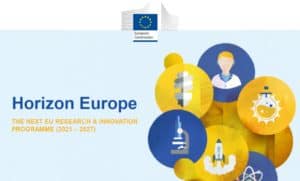
Photo by European Commission
18 countries with which association negotiations are being processed, or where association is imminent: Albania, Armenia, Bosnia and Herzegovina, Faroe Islands, Georgia, Iceland, Israel, Kosovo, Moldova, Montenegro, Morocco, North Macedonia, Norway, Serbia, Tunisia, Turkey, Ukraine and UK.
The EC aims for ratification of the association agreements on Horizon Europe association giving third countries access to the research programme by the end 2021.
Today, the Swiss State Secretariat for Education, Research and Innovation, SERI, confirms that Switzerland will not be considered as an associated country but treated as a non-associated third country. Swiss scientists can participate in Horizon Europe proposals (ca. 2/3 of Horizon Europe is accessible) and will be funded separately by the SERI until new agreements are found.
Some points from the official Status Update of SERI:
- Switzerland will be treated as a non-associated third country in Horizon Europe, the Euratom programme and the Digital Europe Programme. Furthermore, the EU no longer considers Switzerland a state contributing to the construction of ITER.
- The Federal Council remains committed to its goal of a full association to Horizon Europe and other related programmes and initiatives as soon as possible.
- Applicants based in Switzerland must submit their project proposals for the corresponding calls in the year 2021 as participants from a non-associated third country as of now.
- With this status, project participants in Switzerland can still participate in approximately 2/3 of Horizon Europe and notably in most collaborative projects.
- The Swiss project partner will not be funded by the EC but by the SERI
Read the full news item below:
Read the Swiss State Secretariat for Education, Research and Innovation, SERI, Fact sheet on Horizon Europe, 13.7.2021 below:
Karin Metzlaff (Executive Director EPSO)
Roland Peters (Agroscope, CH)
These three aspects are strongly interconnected and tackling them together will improve European R&I capabilities well beyond the time span of this framework programme.
Considering the relatively low funding budgeted for Horizon Europe (i.e., no substantial increase with respect to H2020), it is important to address from the beginning structural features to make it effective and balanced among the three pillars. The analysis of the framework programme presented in the position paper takes into account its impact on many sectors, disciplines, and geographies
The ISE Horizon Europe Task Force has been conducting a long reflection on the European Framework Programme for Research and Innovation, with a focus on the areas it deems of highly strategic importance to the development of the European R&I system.
The three main areas that need more consideration to further enhance the effectiveness and pan-European societal impact of the programme are:
- foster interdisciplinary approaches within the programme
- increase the efforts towards supporting EU-13 countries improve their R&I system
- strengthen the R&I cycle in pillar 2.
Read the full news item here.
Read the full position here
Or click below:
ISE is interested in getting feedback from members in different EU countries to better understand the perspective of local research communities. Send your comments on the paper to Marco Masia, ISE.
Marco Masia (Executive Coordinator ISE, Initiative for Science in Europe),
Karin Metzlaff (Executive Director EPSO & co-chair ISE Task Force Horizon Europe)
See the programme. You can still register at https://europlantbiology2020.org/registration/ and best notify the organisers by email [email protected] to get quick access.
Science themes include for example: Plant performance under abiotic stress (incl. adaptation to climate change), Cell signaling in plants, Plant Metabolism and bioactive compounds (incl. crop improvement for healthy diet), Plants in extreme environments, Plant evolution and development, Trafficking and transport in plants, Chloroplast biology (incl. molecular and cellular organization of the photosynthetic systems), Carbon fixation and productivity, From plant defense to plant immunity, Plant epigenetics, The plant microbiome, Plant nutrition, Translating plant research from lab to field, Genomics and genome editing for crop design.
As you can see from the programme, EPSO is not only involved in the science sessions, but as well in several other sessions we highlight hereafter for you and link the respective files:
Su, 27.6.
18:00 Art & Science virtual exhibition incl. CHIC project opening (Karin Metzlaff in opening) – public access
Mo, 28.6.
9:00 – 9:30 Conference Opening (LOC, FESPB, EPSO – Alan Schulman)
17:30 – 19:00 Art & Science Cooking Workshop CHIC project part 1 (plenary)
Tu, 29.6.
10:30 – 11:00 Ann-Katrin Beuel – EPSO Young Plant Scientist Award (YPSA)
for applied plant research (chair: Ernst van den Ende; plenary – news item page 3)
15:00 – 16:30 Nagoya Protocol panel discussion on access to genetic resources
(GPC & EPSO – Nils Stein; parallel)
17:00 – 18:30 Art & Science Cooking Workshop CHIC project part 2 (parallel)
We, 30.6.
13:00 – 14:30 ‘Plant Research – European Green Deal – Global Future’ science policy session
(organised by EPSO; incl. Alan S & Ulrich Schurr as experts; Karin M, Aldo Ceriotti & Josef Glössl as moderators; plenary – news item page 4)
16:20-16:50 Apolonio Huerta – EPSO Young Plant Scientist Award (YPSA)
for fundamental plant research (chair: Alan S; plenary – news item page 3)
17:00 – 18:30 ‘The ERC – European funding for frontier research in plant science’
(organised by ERC and EPSO; including Dirk Inze; plenary)
Find full information and the YPSA award announcement and the science policy session in the full news item:
Further attached are the A&S exhibition file, the A&S Cooking workshop file, and the ERC info session poster.
Looking forward to engaging with you at the conference!
Alan, Andrea and Karin
Alan Schulman (EPSO President), Andrea Schubert (Conference organiser), Karin Metzlaff (EPSO Executive Director)
Contacts: Karin Metzlaff, Andrea Schubert
These official calls, in combination with hints from the EPSO Brief on the Draft Work Programme which was published on the members only website 5.5.2021, can further advance your proposals.
You find in the EPSO Brief on pages 39-43 the cluster topics relevant for plant scientists – this will help you to find the full call text in the EC published WP without having to read it in full.
Most relevant are:
- ERC – European Research Council Work Programme 2021
- Marie Skłodowska-Curie Actions
- Cluster 6 “Food, Bioeconomy, Natural Resources, Agriculture and Environment”)
- EIC– European Innovation Council Work Programme 2021
We will work on an update EPSO Brief in the coming weeks and we will upload this on the Members only website too.
For further insights for your proposals, join the online EC Info Days on 28.6. – 9.7.2021. No prior registration needed. Cluster 6 is on 7-8 July (Food, bioeconomy, natural resources, agriculture & environment).
We encourage scientists to enter / update their profile in the EC expert database. This is used by the EC for instance to select evaluators for proposals as well as for ongoing projects.
Have a look at the Horizon Europe Rules of Participation and proposal procedure from KoWi.
More details will be forthcoming in our EPSO news page.
Find complete call list and more details in the full news item:
Sources: KoWi news items; EPSO Brief 5.5.2021, EPSO News items
Contact: Karin Metzlaff
